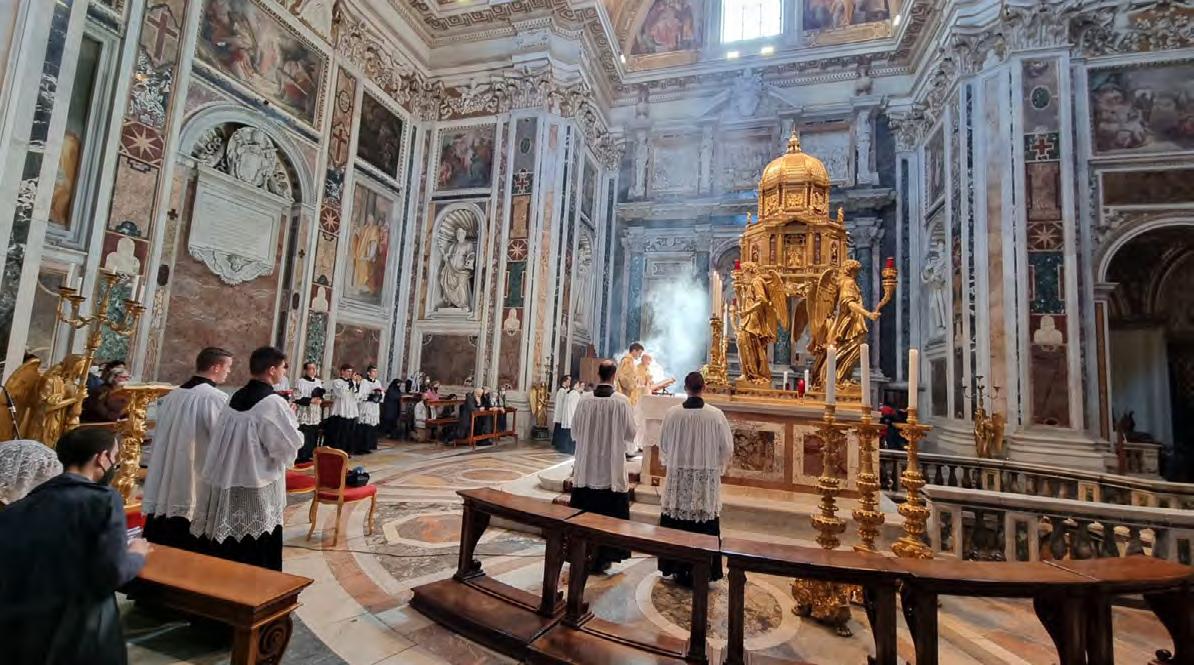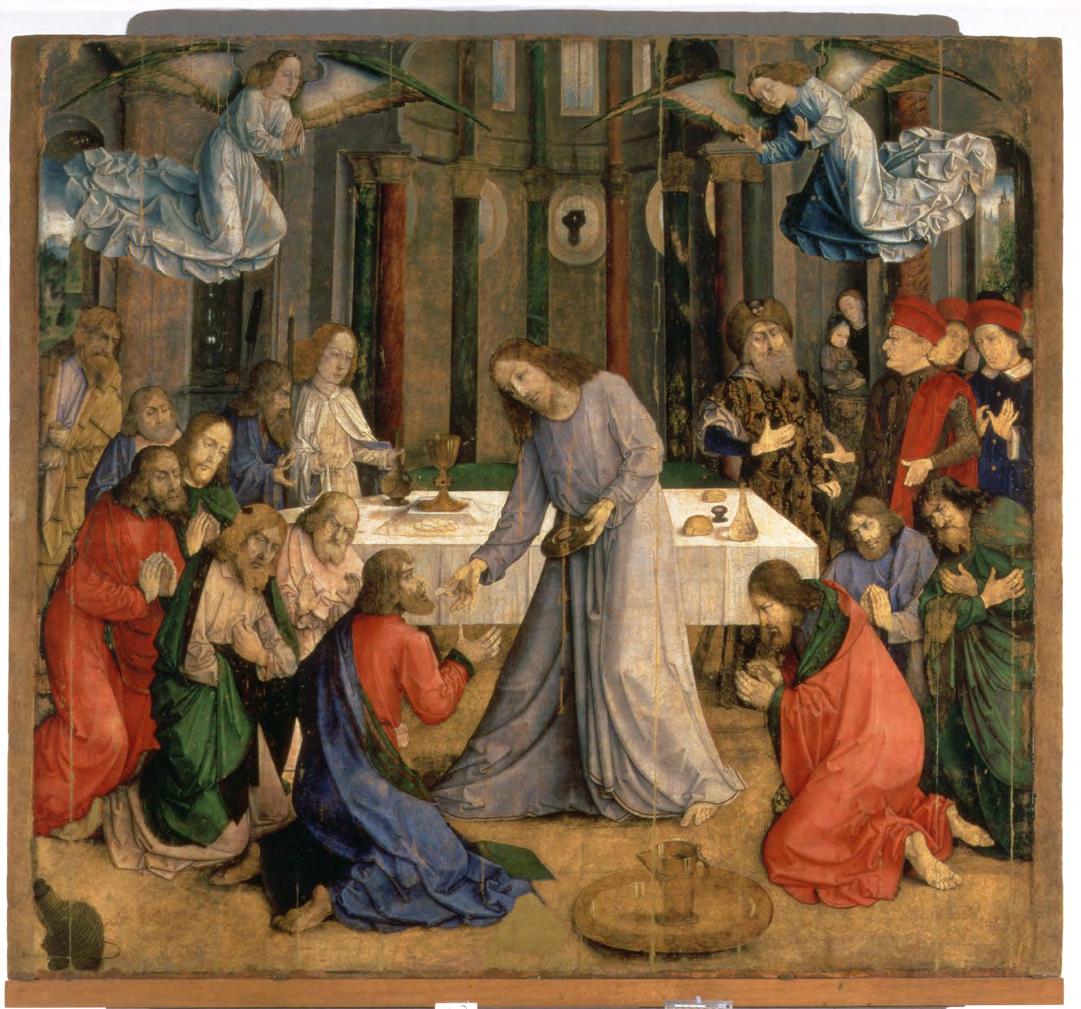
5 minute read
Roman report
A soul we must pity
Pope Francis sought to double down on Traditionis Custodes in June, again asserting—as he had in his confounding July 2021 Motu Proprio—that the post-conciliar liturgical books are “the unique expression of thelex orandiof the Roman Rite” (n. 61).
“We cannot go back to that ritual form which the Council fathers, cum Petro et sub Petro,felt the need to reform” the Pope insists in his 29 June Apostolic Letter on the importance of “liturgical formation,” titled Desiderio Desideravi.
Yet, as Joseph Shaw, Chairman of the Latin Mass Society, has observed, there is no explanation or argumentation in the document but rather only “bald stipulation.” In fact, he notes, “the substantive content of Desiderio Desideravi is strikingly traditional, but [Francis] justdirectsus to believe that this means that the reformed Mass is good and the unreformed Mass is bad.” Others have argued that what the Pope advises in Desiderio Desideravi can all be found in the traditional Mass.
But whatever the hopes and desires of Desiderio Desideravi, the Pope’s Apostolic Letter on “liturgical formation” was rendered practically meaningless by the grave scandal of pro-abortion US House Speaker Nancy Pelosi being given Holy Communion at a Papal Mass in St Peter’s Basilica, on the Solemnity of Saints Peter and Paul.
Just an hour before the document’s release, Pelosi—who was photographed by Vatican Media warmly greeting Pope Francis before the Mass—received the Eucharist from an unidentified priest, despite being barred in May from Holy Communion, in line with canon law, in her home diocese. Archbishop Salvatore Cordileone of San Francisco stressed that he took the decision after years of prayer, fasting and repeated attempts to “meet and speak with Speaker Pelosi” about her support for legalized abortion.
Pelosi’s reception of the Holy Eucharist in St Peter’s Basilica also came just five days after she decried the US Supreme Court’s overturning of Roe v. Wade, calling it an “evisceration” of the rights of Americans, and the realization of a “dark, extreme goal of ripping away a woman’s right to make [her] own reproductive health decisions.” At a June 24 press conference after the ruling, Pelosi— who often touts her Catholic faith—also sharply criticized the idea that, according to her, the Supreme Court decision could lead to a ban on “contraception and in vitro fertilization”, and she vowed to keep “fighting ferociously to enshrine Roe v. Wade into the law of the land.”
The Vatican remained silent about her reception of Holy Communion in the basilica until Pope Francis sat down for an interview with Reuters on 2 July. The Pope condemned abortion, comparing it (as he has in the past) to “hiring a hit man.” But when asked if a Catholic politician who openly supports the “right to choose” abortion should be allowed to receive the Eucharist, Pope Francis said: “When the Church loses its pastoral nature, when a bishop loses his pastoral nature, it causes a political problem,” he said. “That’s all I can say.”
In response to Pelosi’s being given the Eucharist in the Vatican, Bishop Athanasius Schneider, auxiliary bishop of St Mary in Astana, Kazakhstan, said that “reparation must be our first reaction to console Our Lord who is so horribly outraged in the Holy Sacrament.”
“This objectively sacrilegious act, performed in the most holy place of Christianity, in the presence of the Pope […] can only provoke suffering in us because we believe in Him and we love Him: Jesus Christ in the Eucharist,” he said.
Bishop Schneider, whose 2008 Vaticanpublished book Dominus Est influenced Pope Benedict XVI’s decision to exclusively distribute Holy Communion to the faithful kneeling and on the tongue, then stressed that “the person who is most negatively impacted is Mrs Pelosi.”
“She is the poorest one in this horrible scenario of this sacrilegious Communion. She is the one whose soul we must pity, because she is consciously, stubbornly eating her judgment,” he said, recalling St Paul’s admonition (1 Cor 11:29), a verse removed from the Roman Missal in the post-conciliar reform.
On the Holy See’s silence, Bishop Schneider said they should have released, “a strong statement condemning this act” but as they did not do so, the Vatican is “culpable for the damage done to her soul, pushing her further from God and closer to possible damnation.”
“Ultimately,” he said, “the Pope is responsible,” since he is “doing nothing as he sees this soul go consciously and publicly to her perdition. By their silence, the Vatican and the Pope are approving this act,” he said. “We therefore need to make reparation not only for Nancy Pelosi, but also for those in the Vatican.”
In comments made to me for Mass of Ages, Bishop Schneider described Pope Francis’s response to Reuters as reminiscent of Amoris Laetitia and typical of modernist thought. “Doctrine, e.g., on the indissolubility of marriage, is reaffirmed but is then immediately undermined by such confusing and ambiguous statements regarding praxis that the faithful are left thinking it has changed.”
“A true Shepherd uses his crook from time to time,” he added, “but during this pontificate, it’s been conspicuously absent—except, generally, for adherents to the traditional liturgy.”

Bishop Schneider: ‘reparation must be our first reaction’










